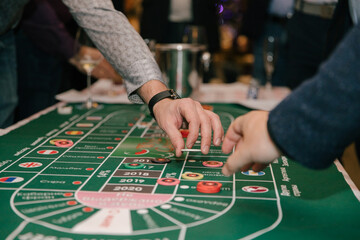When does gambling become an addiction?

Players who go to casinos have their reasons for doing so. Some gamblers come to a casino for the sole purpose of playing, betting and experiencing the joy of winning, while the majority of them come for entertainment and thrills.
Playing the so called “fun and exciting” games is a unique and enjoyable gaming experience, especially with the bonus features and the possibility to win the jackpot.
Other players can experience a different sensation or euphoria simply by observing all the action while participating in the game. The sad thing is that other players are slowly but steadily succumbing to the cold trap of gambling addiction and will eventually become addicted to gambling.
This is the point where a player who used to enjoy gambling becomes addicted to it. It usually starts out as a joyful and enjoyable experience. But over time, the desire to gamble becomes so strong that the player loses control, and the temptation to go to a casino and gamble becomes the ultimate consequence.
People today are inundated with all kinds of addictions such as drugs, alcohol, sex and even gambling, which can be catastrophic for one’s family. How can one find out if a gamer is about to become addicted? If you are bored at any time, you are at home or somewhere other than a casino or a gambling place; this is a symptom that you are becoming obsessed with gambling.
If a player develops a desire to return to a casino and win more money or borrow money solely for gambling, that person is considered addicted to gambling.
With all the fast paced excitement within the world casino, including the overflowing of money and betting from one location to another, it’s no surprise that players sometimes get carried away. This is made worse when the same person wins multiple times in a row. The crucial thing to remember about addiction is that it is curable as long as it admits a problem.
When it comes to gambling and having a good time, there is nothing wrong with it. It is also dangerous if a person or gamer becomes addicted to gambling and becomes addicted to it.
About gambling
Gambling is the wagering of something of value on an uncertain event or game, the outcome of which may be affected by chance, accident, or may have an unexpected consequence due to the gambler’s miscalculation.
The outcome of gambling can be determined solely by chance, such as the completely random behavior of a dice or roulette ball, by physical talent, training or prowess at athletic competitions, or by a combination of strategy and chance. The laws governing gambling can sometimes obscure the link between the components of the game based on skill and luck, allowing some players to manipulate the game to their advantage. Thus, understanding the game is helpful when playing poker or betting on horse races, but useless when buying lottery tickets or playing slot machines.
A gambler can either play the game while betting on the outcome (card games, craps), or by no means participate in an event in which he has an interest (professional athletics, lotteries). Some games are uninteresting or almost meaningless without the associated wager, and they are rarely played unless wagering is included (coin, poker, dice, lotteries). In other games, betting is not an integral part of the game and the association is only coincidental and not required for the success of the game (horse races, football pools). Commercial venues such as casinos and racecourses are allowed to participate in games of chance if a percentage of the money wagered by the customers can be easily obtained by participating in the game as the preferred party, renting space or withdrawing a portion of the wagering pot. Some large-scale events (horse races, raffles) require commercial and professional groups to effectively promote and maintain them.

